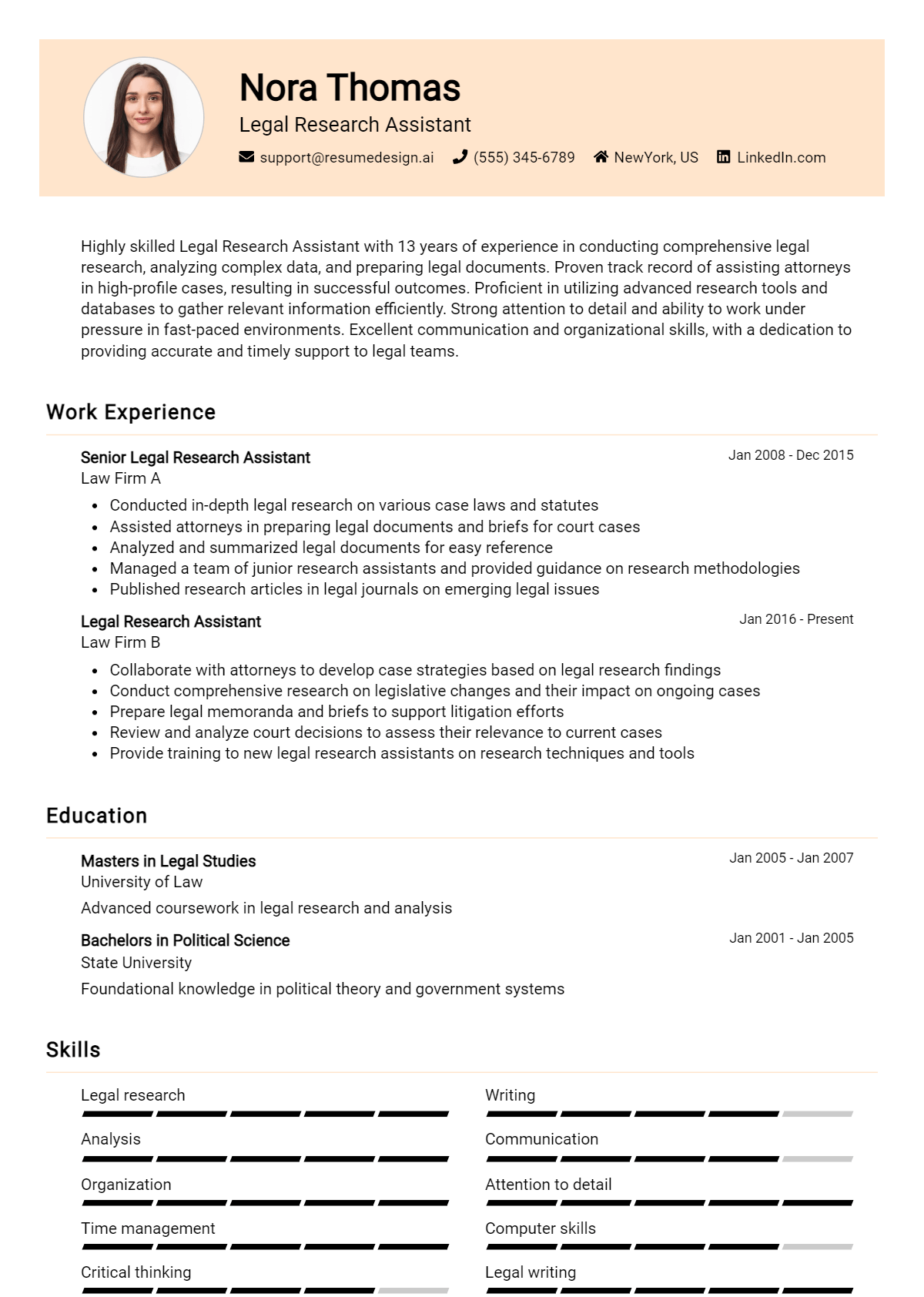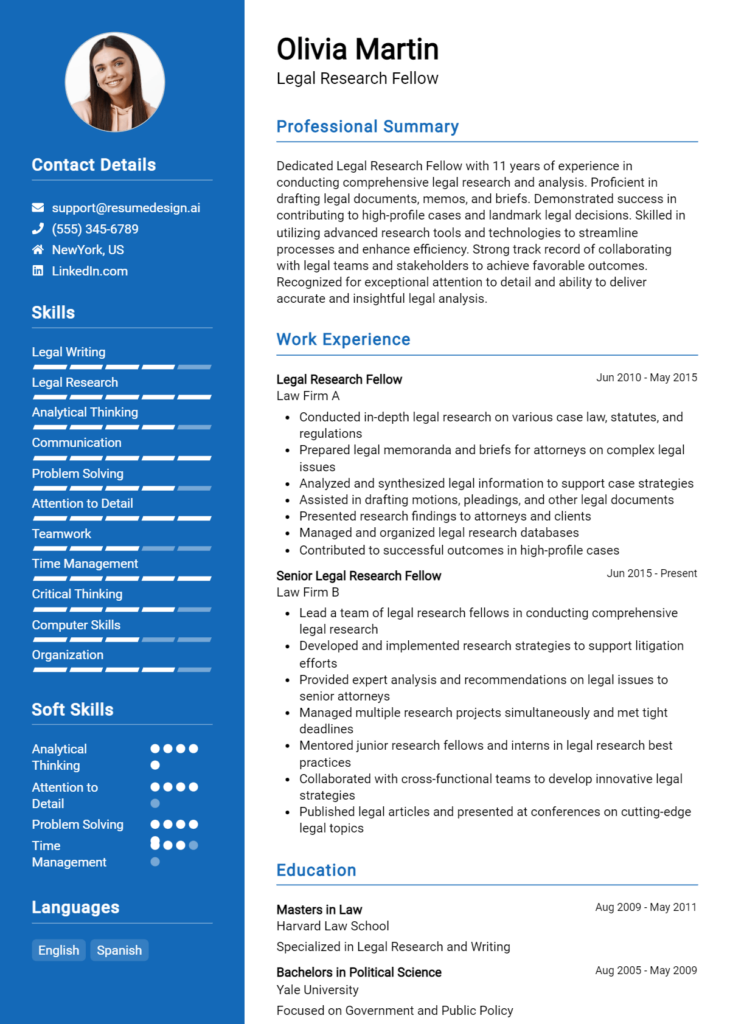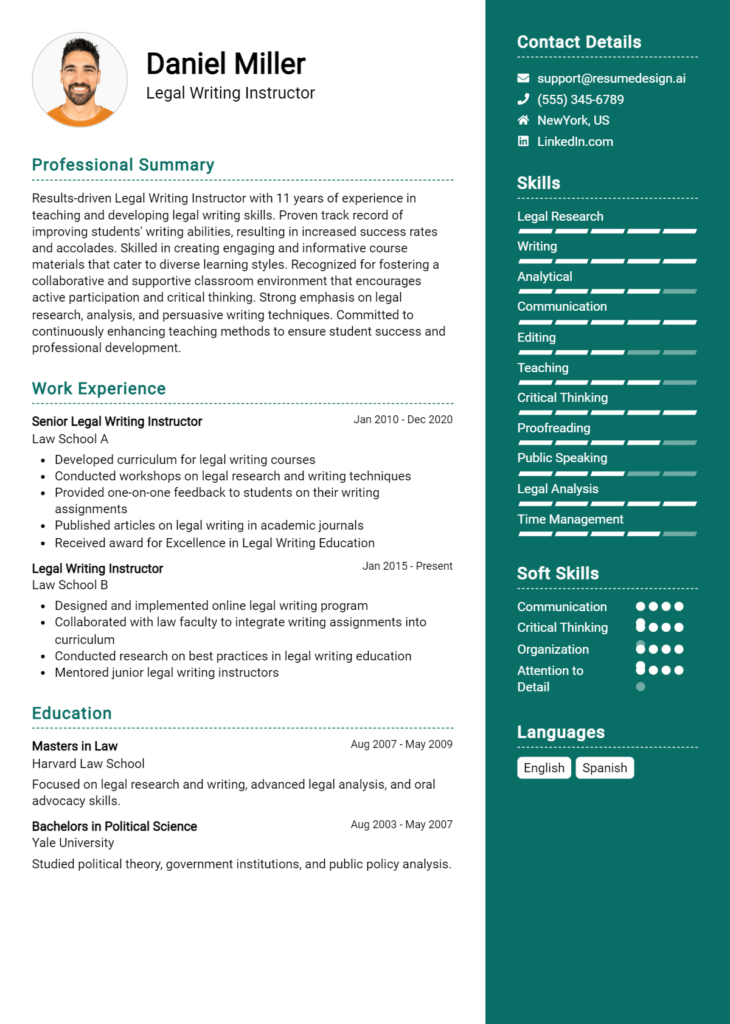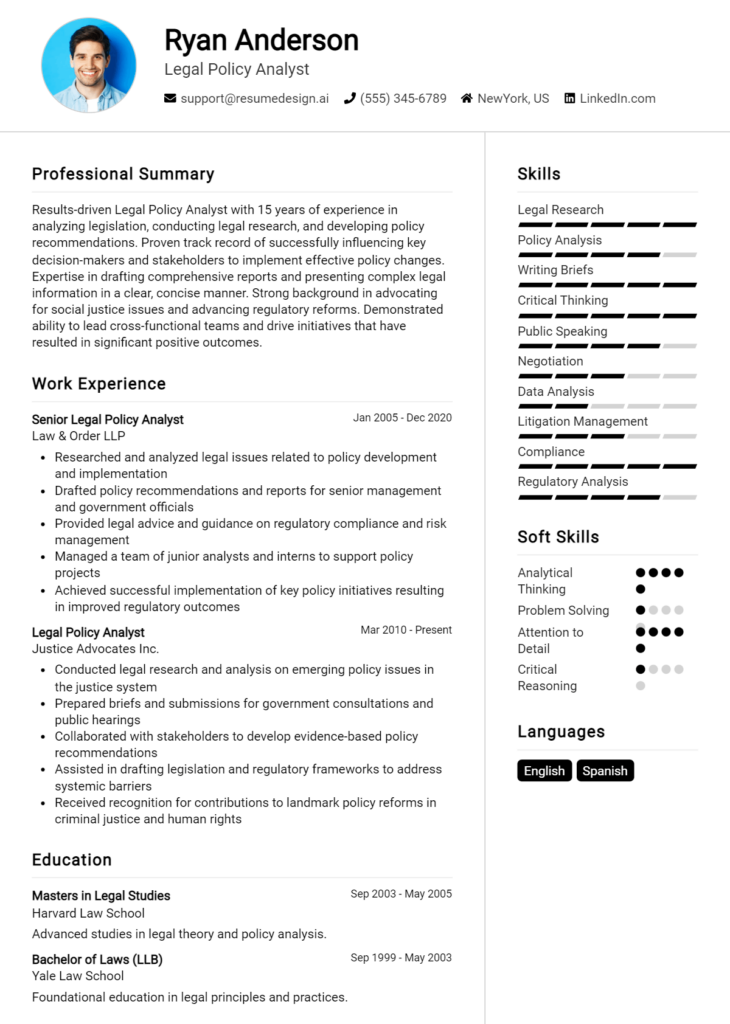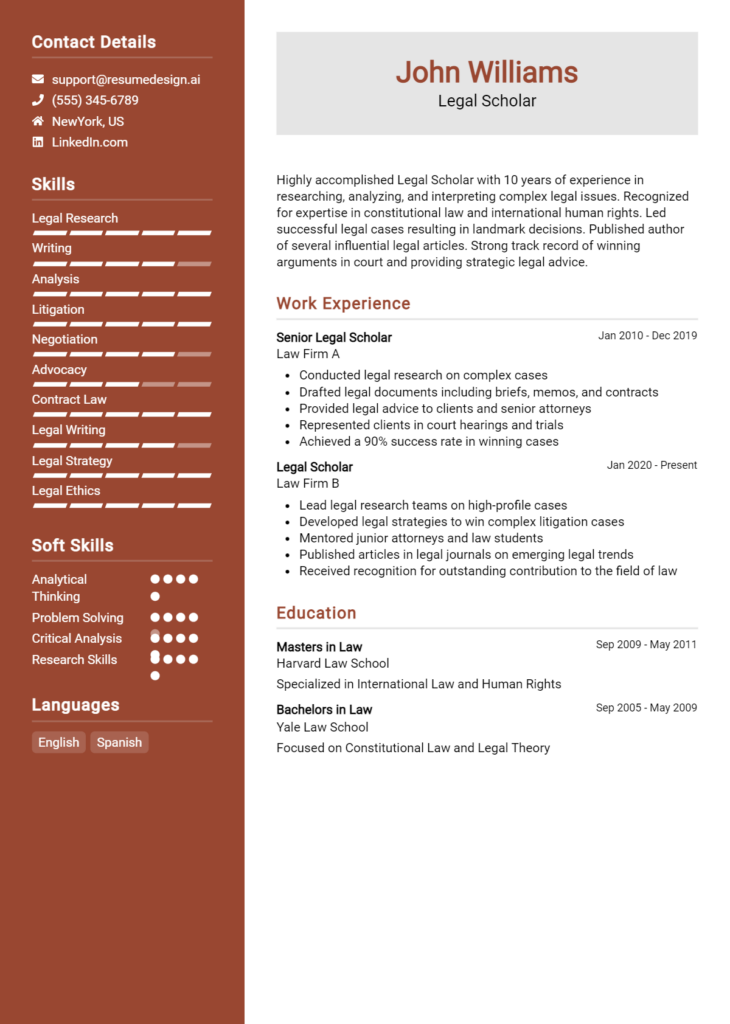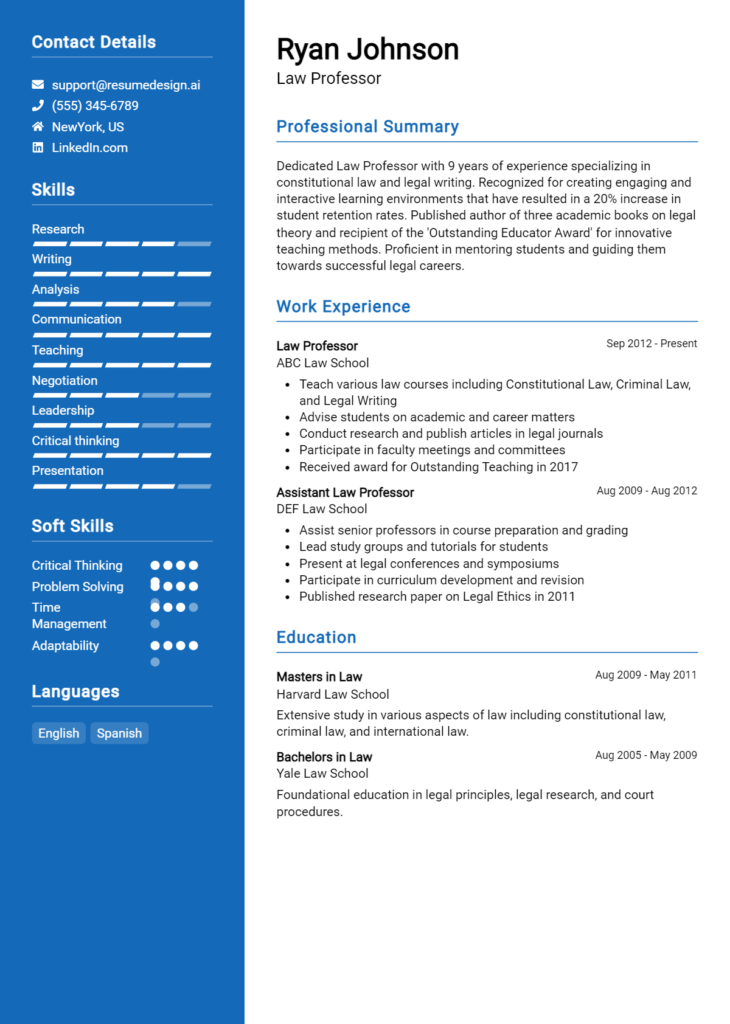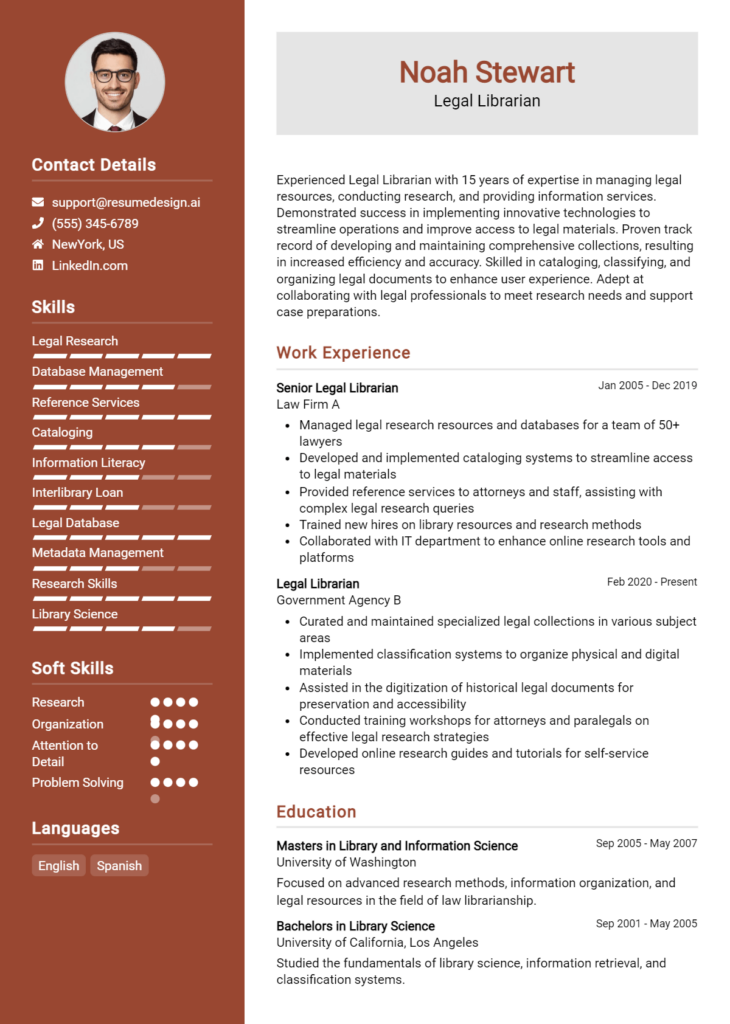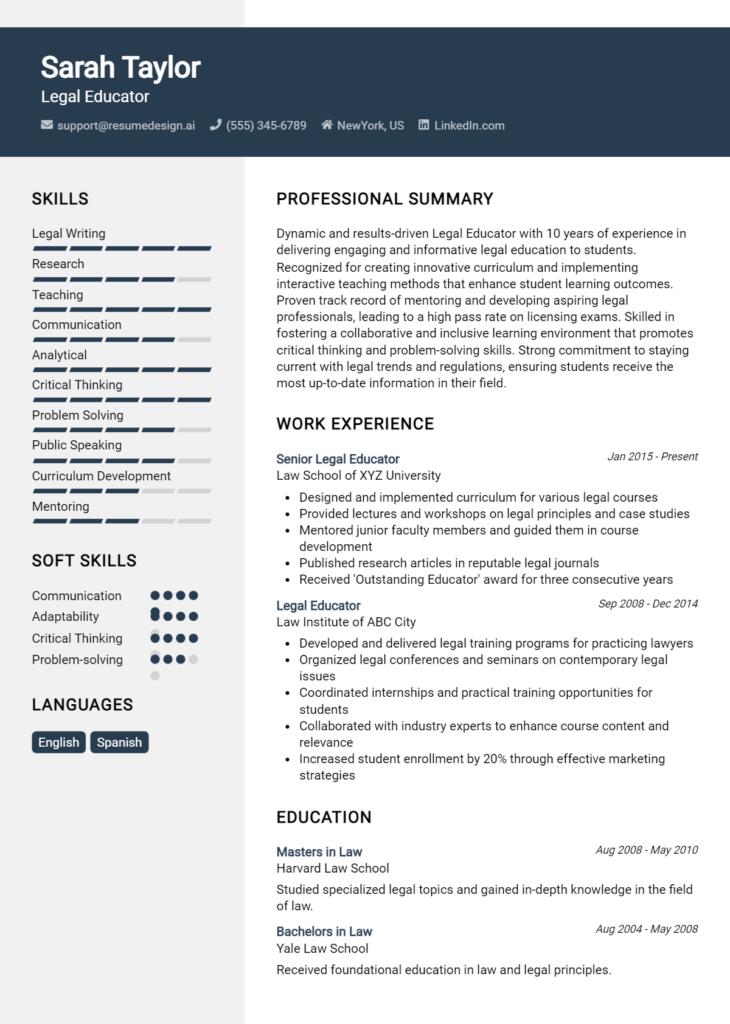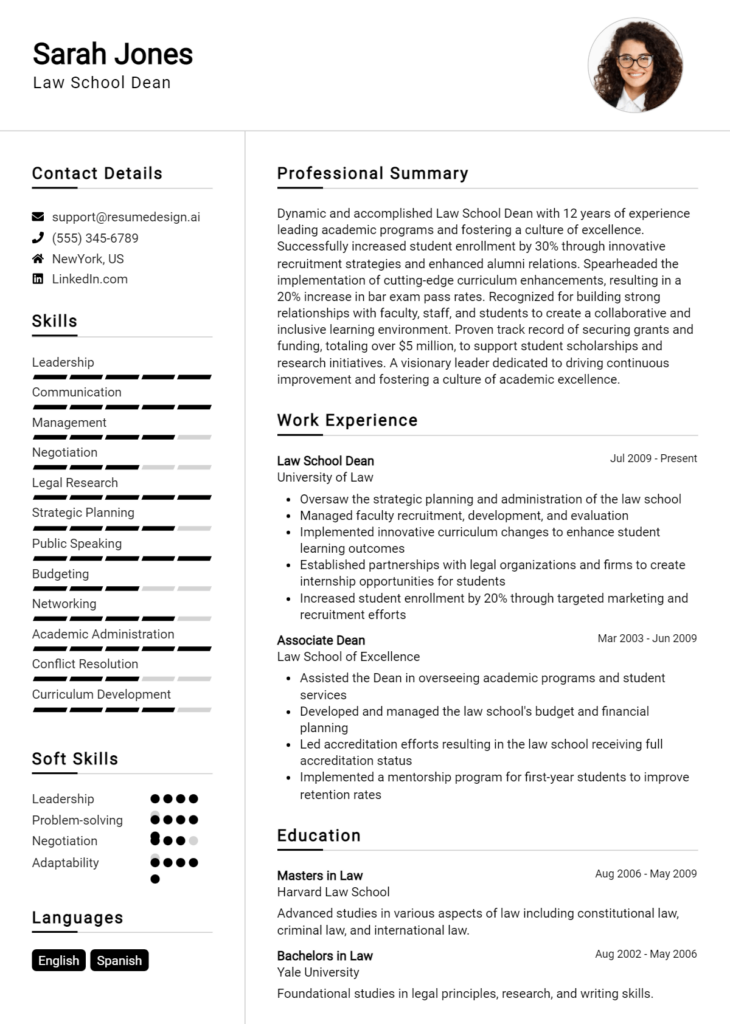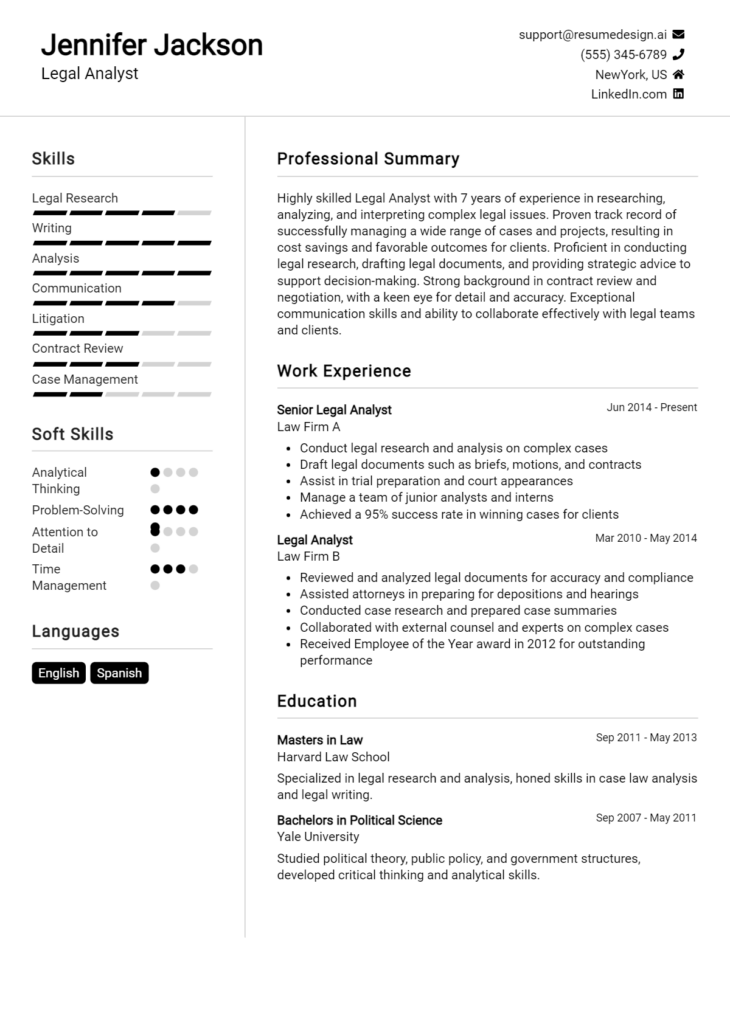Legal Research Assistant Core Responsibilities
A Legal Research Assistant plays a crucial role in supporting legal teams by conducting in-depth research, analyzing case law, and compiling legal documents. This position requires strong technical skills, operational efficiency, and problem-solving abilities to bridge various departments such as litigation, compliance, and corporate law. Effective communication and attention to detail are essential for success, as these skills contribute significantly to the organization's overarching goals. A well-structured resume can effectively showcase these qualifications, enhancing the candidate's prospects.
Common Responsibilities Listed on Legal Research Assistant Resume
- Conduct comprehensive legal research using databases and online resources.
- Analyze statutes, regulations, and case law relevant to ongoing cases.
- Draft and prepare legal documents, briefs, and memoranda.
- Summarize case files and provide detailed reports to attorneys.
- Assist in the preparation of trial materials and exhibits.
- Maintain organized case files and legal research archives.
- Coordinate with various departments to gather necessary information.
- Update and manage legal databases to ensure accurate information.
- Assist attorneys in case strategy development through research findings.
- Monitor changes in laws and regulations affecting the organization.
- Provide administrative support, including scheduling and correspondence.
High-Level Resume Tips for Legal Research Assistant Professionals
In today's competitive job market, a well-crafted resume is crucial for Legal Research Assistant professionals looking to make a lasting first impression. Your resume is often the first point of contact with potential employers, and it serves as a reflection of your skills, achievements, and suitability for the role. A strong resume not only highlights your legal research abilities but also showcases your attention to detail, analytical thinking, and dedication to the legal profession. This guide aims to provide practical and actionable resume tips specifically tailored for Legal Research Assistant professionals, ensuring that you stand out in a crowded field.
Top Resume Tips for Legal Research Assistant Professionals
- Tailor your resume to the specific job description by incorporating relevant keywords and phrases.
- Highlight your legal research experience, including any internships or previous roles related to the position.
- Quantify your achievements where possible, such as the number of cases researched or the accuracy of your findings.
- Showcase industry-specific skills like proficiency in legal research databases (e.g., Westlaw, LexisNexis) and citation formats.
- Include a summary statement at the top of your resume that encapsulates your qualifications and career goals.
- List any relevant certifications or courses that reinforce your expertise in legal research and writing.
- Utilize bullet points for easy readability, focusing on your most significant accomplishments in each role.
- Keep the format clean and professional, using a concise layout that ensures key information stands out.
- Proofread carefully to eliminate any grammatical errors or typos, reflecting your attention to detail.
By implementing these tips, you will significantly enhance your chances of landing a job in the Legal Research Assistant field. A targeted and polished resume will not only demonstrate your qualifications but also convey your enthusiasm for the role, setting you apart from other candidates in a highly competitive landscape.
Why Resume Headlines & Titles are Important for Legal Research Assistant
In the competitive field of legal research, a well-crafted resume headline or title plays a crucial role in capturing the attention of hiring managers. For a Legal Research Assistant, the headline serves as the first impression, summarizing a candidate's key qualifications in a concise and impactful manner. A strong headline not only reflects the applicant's relevant skills and experiences but also aligns with the specific needs of the position being applied for. By effectively communicating their strengths in just a few words, candidates can set themselves apart from the competition and increase their chances of being noticed in a pool of applicants.
Best Practices for Crafting Resume Headlines for Legal Research Assistant
- Be Concise: Aim for a headline that is brief yet informative, ideally no more than 10 words.
- Be Specific: Use precise terms that relate directly to the role of a Legal Research Assistant.
- Highlight Key Skills: Focus on the skills that are most relevant to the job and that distinguish you from other candidates.
- Use Action Words: Incorporate strong action verbs to create a dynamic and engaging title.
- Incorporate Keywords: Include industry-specific keywords that hiring managers are likely to search for.
- Tailor for Each Application: Customize your headline for each job application to reflect the specific requirements of the position.
- Avoid Jargon: Keep language clear and professional to ensure readability and understanding.
- Showcase Accomplishments: If possible, highlight any notable achievements or contributions that directly relate to legal research.
Example Resume Headlines for Legal Research Assistant
Strong Resume Headlines
Detail-Oriented Legal Research Assistant with 5+ Years of Experience
Skilled Legal Researcher Specializing in Intellectual Property Law
Proven Track Record of Supporting Complex Litigation Through In-Depth Research
Effective Legal Research Assistant with Expertise in Case Law Analysis
Weak Resume Headlines
Looking for a Job
Legal Assistant
Student Seeking Employment
The strong headlines are effective because they clearly communicate the candidate’s relevant skills and experiences, making it easy for hiring managers to see their value at a glance. They are specific, impactful, and tailored to the role of a Legal Research Assistant, which helps them stand out. In contrast, the weak headlines fail to impress as they are vague and generic, providing little information about the candidate's qualifications or suitability for the position. These types of titles do not capture the attention of hiring managers and can lead to the resume being overlooked.
Writing an Exceptional Legal Research Assistant Resume Summary
A well-crafted resume summary is crucial for a Legal Research Assistant as it serves as the candidate's first impression to hiring managers. This concise statement distills key skills, relevant experience, and notable accomplishments into a snapshot that quickly captures attention. A strong summary effectively highlights the candidate's qualifications and makes a compelling case for why they are a suitable fit for the role, increasing the likelihood of progressing to the interview stage. To be effective, the summary should be impactful, succinct, and tailored specifically to the job description, ensuring that it resonates with the needs of the potential employer.
Best Practices for Writing a Legal Research Assistant Resume Summary
- Quantify Achievements: Use numbers and specific outcomes to demonstrate your impact in previous roles.
- Focus on Skills: Highlight both hard and soft skills relevant to legal research, such as analytical thinking, attention to detail, and proficiency with legal databases.
- Tailor to the Job Description: Align your summary with the specific requirements and keywords found in the job posting.
- Be Concise: Aim for 2-4 sentences that succinctly convey your qualifications without unnecessary jargon.
- Highlight Relevant Experience: Emphasize experience in legal research, writing, and any relevant internships or positions held.
- Showcase Industry Knowledge: Mention familiarity with specific areas of law or legal terminology that can set you apart from other candidates.
- Include Certifications: If applicable, highlight any relevant certifications that enhance your qualifications.
- Use Action-Oriented Language: Start with strong action verbs to convey confidence and proactivity.
Example Legal Research Assistant Resume Summaries
Strong Resume Summaries
Detail-oriented Legal Research Assistant with over 3 years of experience supporting attorneys in preparing for trials. Successfully conducted in-depth legal research that contributed to winning 85% of cases, utilizing tools such as LexisNexis and Westlaw.
Motivated legal professional with a proven track record of drafting legal memoranda and summarizing case law. Achieved a 30% reduction in research time through effective database management and organization, ensuring timely case preparation.
Dedicated Legal Research Assistant skilled in analyzing legal documents and conducting comprehensive case law research. Collaborated on a high-profile case, where thorough research led to a favorable settlement and saved the firm over $150,000.
Weak Resume Summaries
Legal Research Assistant with some experience in legal research and writing. Looking for a job where I can use my skills.
Detail-oriented individual seeking a position as a Legal Research Assistant. I have experience in research and am interested in law.
The examples of strong resume summaries are effective because they provide specific achievements and quantifiable outcomes, showcasing the candidate's direct contributions to their previous roles. They also highlight relevant skills and experiences tailored to the Legal Research Assistant position. Conversely, the weak summaries lack detail and fail to convey any measurable impact or specific competencies, making them too generic and unremarkable for hiring managers.
Work Experience Section for Legal Research Assistant Resume
The work experience section of a Legal Research Assistant resume is crucial as it serves as a window into the candidate's practical abilities and contributions in a professional setting. This section not only highlights the candidate's technical skills in legal research and analysis but also demonstrates their capability to manage teams and collaborate effectively with others. By showcasing achievements that can be quantified and aligning past experiences with industry standards, candidates can present themselves as strong contenders in the competitive legal field.
Best Practices for Legal Research Assistant Work Experience
- Highlight specific technical skills relevant to legal research, such as proficiency in legal databases and research tools.
- Quantify achievements where possible, using metrics to demonstrate the impact of your work.
- Emphasize collaboration by detailing team projects and your role in achieving common goals.
- Use action verbs to convey a sense of proactivity and leadership in your experiences.
- Align descriptions with industry standards to ensure relevance and clarity.
- Focus on outcomes—describe how your work led to successful case resolutions or improved processes.
- Keep descriptions concise and relevant to the role you are applying for.
- Include any relevant training, certifications, or workshops that enhance your qualifications.
Example Work Experiences for Legal Research Assistant
Strong Experiences
- Conducted in-depth legal research that contributed to a 30% increase in case win rates for client litigation.
- Led a team of three research assistants in a project that streamlined document retrieval processes, reducing average time spent per case by 25%.
- Collaborated with attorneys to prepare legal briefs, resulting in a successful outcome in over 15 high-stakes cases.
- Implemented a new database management system that improved data accuracy and accessibility, enhancing overall research efficiency by 40%.
Weak Experiences
- Assisted with legal research tasks.
- Worked on various projects with little detail on contributions.
- Helped the team with document preparation.
- Participated in meetings and discussions about cases.
The examples provided illustrate a stark contrast between strong and weak experiences. Strong experiences are characterized by specific, quantifiable outcomes that demonstrate technical proficiency and a proactive approach, showcasing the candidate's ability to make significant contributions. In contrast, weak experiences lack detail and do not highlight any measurable impact, rendering them unimpressive and failing to convey the candidate's true capabilities in the legal field.
Education and Certifications Section for Legal Research Assistant Resume
The education and certifications section of a Legal Research Assistant resume plays a vital role in showcasing a candidate's academic qualifications, industry-relevant certifications, and commitment to continuous learning. This section not only reflects the candidate's foundational knowledge in legal studies but also highlights any specialized training that aligns with the demands of the role. By providing relevant coursework and certifications, candidates can significantly enhance their credibility, demonstrating their preparedness and expertise to potential employers in the legal field.
Best Practices for Legal Research Assistant Education and Certifications
- Focus on relevant degrees, such as a Bachelor's in Legal Studies, Paralegal Studies, or a related field.
- Include industry-recognized certifications, like the Certified Legal Assistant (CLA) or the National Association of Legal Assistants (NALA) certification.
- Highlight relevant coursework that pertains to legal research, writing, and analysis.
- Provide details about specialized training, workshops, or continuing education courses that enhance legal research skills.
- List honors or distinctions received during academic pursuits to showcase excellence.
- Keep the section organized and concise, clearly presenting information for easy readability.
- Update this section regularly to reflect any new qualifications or professional development efforts.
- Avoid including high school diplomas if the candidate has higher education credentials.
Example Education and Certifications for Legal Research Assistant
Strong Examples
- Bachelor of Arts in Legal Studies, University of Example, May 2021
- Certified Legal Assistant (CLA) from the National Association of Legal Assistants, 2022
- Relevant Coursework: Advanced Legal Research, Legal Writing, and Ethics in Law
- Completion of a Legal Research and Writing Workshop, 2023
Weak Examples
- Associate Degree in General Studies, Community College, 2019
- Certification in Microsoft Office Applications, 2020
- High School Diploma, Example High School, 2017
- Outdated Paralegal Certification from an unrecognized institution, 2015
The examples listed as strong reflect relevant educational qualifications and certifications that directly enhance the candidate's qualifications for a Legal Research Assistant role. They indicate a focused academic background and a commitment to professional development in the legal field. In contrast, the weak examples demonstrate a lack of relevance to the position, with outdated or unrelated qualifications that do not contribute to the candidate’s suitability for the role. This distinction underscores the importance of tailoring education and certification information to match industry expectations.
Top Skills & Keywords for Legal Research Assistant Resume
As a Legal Research Assistant, possessing the right skills is essential for success in this role. Employers seek candidates who can efficiently navigate legal databases, analyze complex information, and produce clear, concise reports. Highlighting both hard and soft skills on your resume can set you apart from the competition and demonstrate your ability to support legal teams effectively. A well-crafted resume should not only showcase your knowledge of legal concepts but also your interpersonal abilities, which are crucial for collaborating with attorneys and other legal professionals. For more information on how to emphasize your skills, check out these skills.
Top Hard & Soft Skills for Legal Research Assistant
Soft Skills
- Strong communication skills
- Attention to detail
- Analytical thinking
- Time management
- Problem-solving abilities
- Team collaboration
- Adaptability
- Organization skills
- Critical thinking
- Interpersonal skills
- Initiative and self-motivation
- Dependability
- Research aptitude
- Ethical judgment
- Professionalism
Hard Skills
- Proficiency in legal research databases (e.g., Westlaw, LexisNexis)
- Understanding of legal terminology and concepts
- Familiarity with legal writing and citation standards
- Data analysis and interpretation
- Document management systems
- Case law analysis
- Knowledge of statutory and regulatory frameworks
- Microsoft Office Suite (Word, Excel, PowerPoint)
- Evidence gathering techniques
- Drafting legal documents and briefs
- Familiarity with court procedures and filings
- Ability to summarize complex legal information
- Legal compliance and risk assessment
- Research methodologies
- Knowledge of specific areas of law (e.g., corporate, criminal, intellectual property)
By focusing on these essential skills and demonstrating relevant work experience, you can enhance your resume and present yourself as a well-rounded candidate for the position of Legal Research Assistant.
Stand Out with a Winning Legal Research Assistant Cover Letter
Dear [Hiring Manager's Name],
I am excited to apply for the Legal Research Assistant position at [Company/Organization Name], as advertised on [where you found the job listing]. With a strong background in legal studies, exceptional research skills, and a passion for supporting legal professionals, I am confident in my ability to contribute effectively to your team. My academic achievements, combined with practical experience in legal research, have equipped me with the skills necessary to excel in this role.
During my time at [Your University], where I earned my degree in [Your Degree], I developed a solid foundation in legal principles and research methodologies. My coursework included extensive training in case law analysis, statutory interpretation, and legal writing. Additionally, I interned at [Previous Internship/Job], where I was responsible for conducting comprehensive legal research, drafting memoranda, and summarizing case law for attorneys. This experience honed my analytical abilities and attention to detail, allowing me to efficiently sift through vast amounts of information to find relevant legal precedents.
I am particularly drawn to the opportunity at [Company/Organization Name] because of your commitment to [specific aspect of the company or its mission]. I am eager to leverage my research expertise to support your team in delivering thorough and accurate legal analysis. Furthermore, I am proficient in utilizing various legal research databases, including Westlaw and LexisNexis, which will enable me to quickly gather pertinent information and assist your attorneys in their case preparations.
Thank you for considering my application. I am enthusiastic about the possibility of contributing to the success of [Company/Organization Name] as a Legal Research Assistant. I look forward to the opportunity to discuss how my skills and experiences align with your needs in further detail.
Sincerely,
[Your Name]
[Your Contact Information]
[Your LinkedIn Profile or Website, if applicable]
Common Mistakes to Avoid in a Legal Research Assistant Resume
When crafting a resume for a Legal Research Assistant position, it's crucial to present your skills and experience in the best possible light. However, many candidates make common mistakes that can undermine their chances of landing an interview. By being aware of these pitfalls, you can create a more compelling and professional resume that stands out to potential employers. Here are some common mistakes to avoid:
Overloading with Jargon: Using excessive legal terminology can confuse hiring managers who may not be experts in every area of law. Aim for clear, concise language.
Lack of Specificity: Failing to include specific examples of your research experience or accomplishments can make your qualifications seem vague. Use quantifiable achievements when possible.
Ignoring Formatting: A cluttered or poorly formatted resume can detract from its readability. Maintain a clean, professional layout with consistent fonts and spacing.
Long-Winded Descriptions: Being overly verbose can dilute the impact of your experiences. Focus on brevity and clarity by using bullet points to summarize your responsibilities and achievements.
Neglecting Keywords: Many employers use Applicant Tracking Systems (ATS) to screen resumes. Failing to incorporate relevant keywords from the job description can lead to your application being overlooked.
Omitting Relevant Skills: It's essential to highlight both hard and soft skills relevant to legal research, such as analytical thinking, attention to detail, and proficiency in legal research databases.
Not Tailoring the Resume: Sending the same resume to multiple employers can be detrimental. Tailor your resume to each job application by aligning your skills and experiences with the specific job requirements.
Including Irrelevant Experience: Listing unrelated work experiences can clutter your resume and distract from your qualifications. Focus on experiences that demonstrate your legal research capabilities and skills.
Conclusion
As a Legal Research Assistant, your role is critical in supporting attorneys by conducting thorough legal research, analyzing case law, and compiling relevant information. Key skills necessary for success in this position include strong analytical abilities, attention to detail, excellent writing skills, and familiarity with legal databases and research tools.
In summary, your resume should reflect not only your legal knowledge but also your research capabilities, communication skills, and any relevant experiences that set you apart from other candidates. Make sure to highlight specific projects or cases where your contributions made a significant impact, and ensure your formatting is clean and professional.
To enhance your chances of landing a Legal Research Assistant role, take the time to review your resume critically. Ensure it effectively showcases your qualifications and aligns with the demands of the position. Consider utilizing various resources available to you, such as resume templates, which can help you create a polished format; the resume builder for an easy and guided resume creation experience; resume examples to inspire your content; and cover letter templates to complement your application.
Take action today and refine your resume to increase your chances of success in your legal career!

